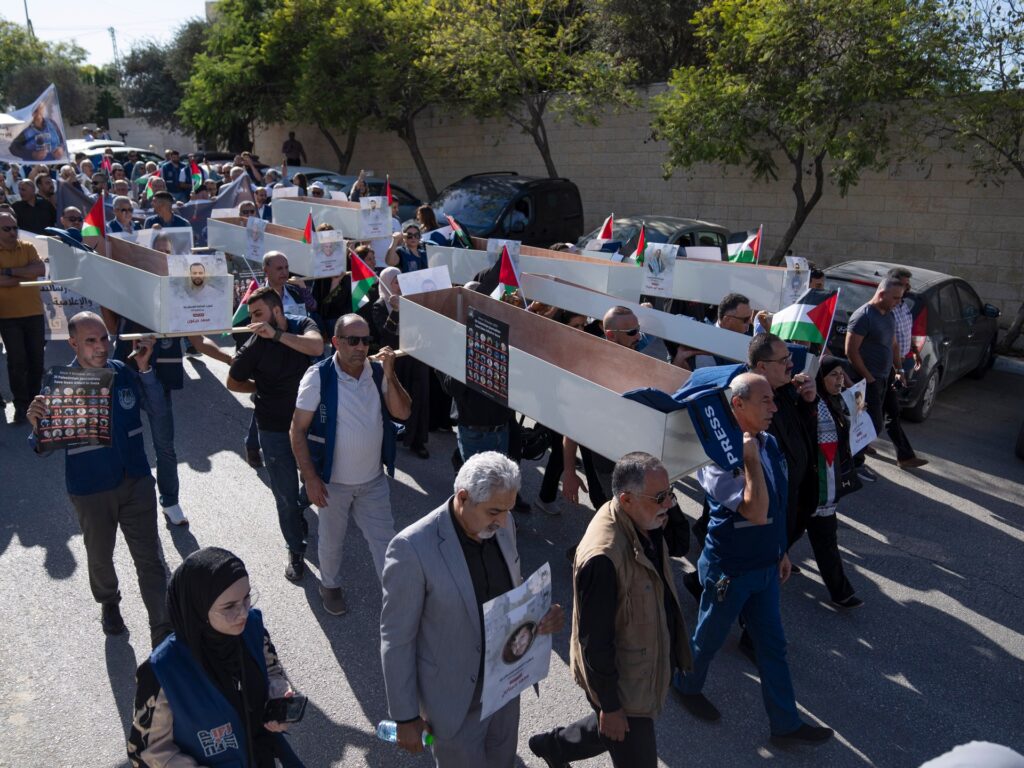JOURNALIST’S NOTEBOOK
Even as Palestinians in the West Bank protest Israel’s war on Gaza, they themselves face increasing attacks.
Ramallah, occupied West Bank – The Qalandia checkpoint was not manned. There were only a few cars trying to cross the occupied West Bank from Jerusalem.
It was November 1, and Palestinian groups had declared it a “day of anger” to protest Israel’s continued bombing of the Gaza Strip. The day before, Israeli bombs devastated the Jabalia refugee camp, north of Gaza. The camp will suffer another hard blow on November 1, then again a few days later.
In Ramallah, garbage containers blocked certain streets. Shops, restaurants and cafes were closed while street vendors sold bananas to protesters. A large banner in Al-Manara Square read in English and Arabic: “We are not numbers,” alongside photos of some of the more than 4,000 Palestinian children who were killed in the bombing.
About 200 people gathered to march, most of them teenagers. Some covered their faces, others carried posters with graphic images of children killed in Gaza.
A 38-year-old man took part in the demonstration with his wife and young son. “We have been relying on the international community for 25 to 30 years, and things are only getting more complicated,” he told Al Jazeera, expressing a sentiment shared by many Palestinians about the lack of a response unified and effective international community to put an end to the problem. attacks on Gaza.
Like many others at the rally, he criticized the Palestinian Authority for not doing enough to defend Palestinian interests during the war. He put his son on his shoulders and continued on his way.
Another protester, a 35-year-old woman from Bethlehem, said she had been unable to return to her town because of reinforced checkpoints. But most of all, she says, she fears the settlers who have surrounded her hometown.
“Netanyahu gave thousands of weapons to the settlers. They do what they want,” she said, referring to Israeli Prime Minister Benjamin Netanyahu. Israeli National Security Minister Itamar Ben-Gvir personally distributed weapons to West Bank settlers and said he had acquired 10,000 assault rifles to distribute.
When asked how she thought the war might end, the woman replied: “Palestinians need the right to their land. Palestinians must be free.
Some of the young protesters at the rally shouted slogans threatening violence against Israel. A thin septuagenarian with glasses, who passed by, murmured: “They are being radicalized.” He said he disapproved of violence as a means of resistance.
A day after the protest near Yasser Arafat’s mausoleum in Ramallah, a 29-year-old man with bright green eyes and a provocative gaze worked in a cafe while chatting with customers. Palestinian Authority officials, he said, “sit in their chairs and do nothing.”
“They (the settlers) are armed. We are not. Where is the resistance? He asked. He took out his cell phone to show videos of the body of a Palestinian teenager killed that day.
On the morning of November 2, the Israeli army attacked the town of Qalqilya, near Ramallah, killing two Palestinians. One of them was 14-year-old Ayhem Mahmud al-Shafi.
Since October 7, at least 183 Palestinians, including 44 children, have died in the West Bank in attacks carried out by Israeli forces or settlers. More than 11,200 Palestinians were killed in the Gaza Strip and around 1,200 people were killed during Hamas attacks on southern Israel on October 7.
Ayham’s body was carried through the streets of Ramallah by hundreds of mourners. Merchants closed their businesses while mourners marched through the streets, chanting revolutionary songs about martyrs and the liberation of Palestine.
Some mourners invited spectators to join the procession. On the sidewalks, a few women were crying. Others recorded the procession with their cell phones.
As the body crossed Al-Amara Square, the procession stopped for a moment: Ayhem’s father, mother, uncle and a neighbor said goodbye. To them and to hundreds of mourners, Ayhem was not a number.

